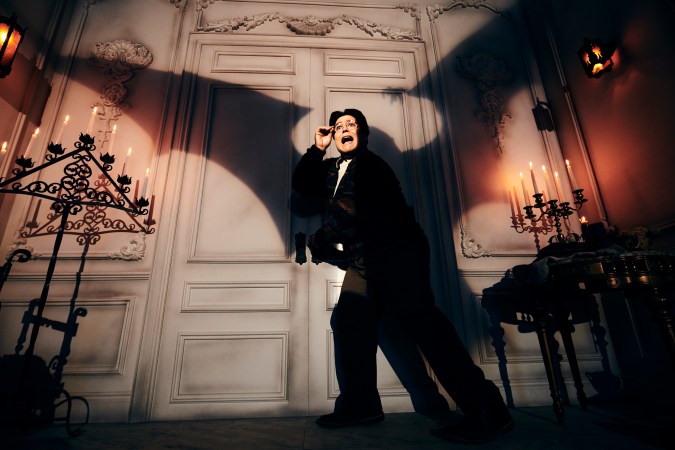You wouldn’t know it, but the buñuelos you see in the season two finale of FX’s What We Do in the Shadows, at Guillermo de la Cruz’s mother’s house, were whipped up last minute by the actor who plays him. It didn’t sit well with Harvey Guillén, who plays a vampire familiar of Mexican descent, that the buñuelos he found on set were not Mexican.
“I’m not going to live with myself if I don’t have the right buñuelos in the background,” he tells Remezcla. “If someone catches these buñuelos that are not Mexican? Oh no.’ If you caught it, you caught it, but it was for my own peace of mind.”
Alongside the team, including executive producers Paul Simms and Stefani Robinson, Guillén put a lot of thought into reworking the original script, to make sure every detail of that particular scene was representative of Guillermo and his culture, from the buñuelos, the decor, to the dynamic and mannerisms between him and his mom Silva (played by Myrna Cabello).
Guillén prides himself in playing a range of roles, proving to a new generation of LGBTQIA+ Latinx actors that they too can pursue the roles they dreamt of seeing on-screen when they were younger, without budging on who they are off-screen. “I try to do things that are a little different, like playing a superhero–something that I would never have thought I would play because the traditional standards of Hollywood wouldn’t give a guy who’s short and stout a role like that to portray,” he says.

Growing up in Orange County with his mom and late step-father, Guillén watched plenty of classic Mexican television and films such as Cantinflas and El Chavo del Ocho. But still he was discouraged. “For me growing up, the thing was that I never saw myself represented on TV. I never saw myself represented in [the] mainstream. When I turned on the American television, there was no one who looked like me. It kind of discouraged me, because it made me feel like there wasn’t an open door,” he shared.
“And so when I realized that there was no one who looked like me on TV, I said, ‘Can I be the first?’ I really made it a goal to go after it. At that age, when you’re little, coming from a poor family with immigrant parents, I remember thinking, ‘I have nothing, so I have nothing to lose, only gain.’ For me, once I made that realization, nothing could stop me. Nothing. Because every little step I took was a stepping stone in the right direction. You keep stepping on those stones and then eventually, you’re going to get to your destination.”
While working in theatre, Guillén took his agent’s (then teacher’s) advice to take on the stage name, Harvey. What came from frustration for many who didn’t know how to pronounce his given name (Javier), became a way for Guillén to protect his sanity and his relationships with his loved ones. He uses his stage name as the boundary between his personal and professional life.
“I realized I was living [in] two different worlds. There was a career-driven person that wanted to be part of Hollywood and [who] very much knew that, at that time, Hollywood would close a lot of doors if they can’t pronounce your name. But that shouldn’t take away from the talent that I’m presenting. And so, if the package looks a certain way, and you feel like an instant rapport with the brand, then you’re more willing to be like, ‘Oh, yeah, let’s do it.’ Because at the end of the day, my talent is what’s opening the door,” he shares.
He thinks of it as inhabiting two different worlds, learning how to dissociate the two. It helps that, for all the work he’s done — including an upcoming comedy film, Werewolves Within, scheduled for a 2021 release, and an episode in the next season of HBO’s Room 104 — his mom will forever know him best for appearing in a Spanish language MetroPCS commercial.
“You would have thought I won every Academy Award. That I won everything under the sun. Every time I see her, when I go home for the weekend, she’d be talking to our neighbors or tías, with her cafecito. She’d be like, ‘Es mi hijo de MetroPCS.” No matter the lead role nothing will top those commercials.
While that may sound like a putdown on Guillén’s more laudable work (he won a GLAAD Media Award for his work on Raising Hope, after all) the actor knows it’s important to capitalize the moments where he gets to celebrate his success with his family.
“A Spanish-speaking commercial is how my mom can connect [with what I do]. She can relate to it and the trajectory of my success. The pinnacle was where she can be a part of it, and she can cheer me on because she understood the content.”
Guillén sees his work as emboldening Mexicans all over, encouraging those in the industry specifically to be loud advocates for their work. “At the end of the day, you have to make noise. What we’re witnessing is that you have to make noise to grab what you deserve. I think that for so long, you’re told that you’re not worthy. So if you do get invited to the party, you’ll take scraps and it’s like, ‘No!’ We have to change the mentality. We are definitely worthy. We are all worthy, and no one is less than, so why are we treated that way?”
“If anything, what I do is just to inspire that next gordito, Mexican, queer kid who may be seeing stuff on-screen and be like, ‘Whoa, if he can do it…’ That’s right! You can do it too, mijo.”
What We Do in the Shadows just wrapped its second season which is available on Hulu.




